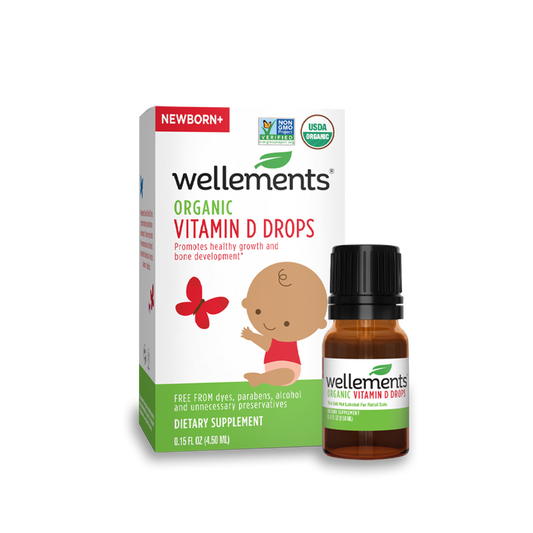Buyer's Guide: Wellements Vitamin D Drops for Newborns & Babies
| updated:Share

Vitamin D has a critical job: supporting your baby’s growth. Given the average baby doubles in weight within the first four to six months of life, adequate nutrition is essential to healthy growth and development. While a newborn will get many of the necessary nutrients from formula and/or breastmilk, supplements also play an important role in amending vitamin deficiencies. Vitamin D deficiency is often one parents need to account for.
Why Do Babies Need Vitamin D?
By aiding in the absorption of calcium, vitamin D is critical in the development of strong, healthy bones. Too low of vitamin D levels and an infant becomes at increased risk of developing rickets: a childhood condition characterized by soft bone that is more susceptible to breaks and fractures, which can evolve into other complex diseases later on in life.
Though breast milk is often perceived as nutritionally balanced, it is naturally low in Vitamin D. A 2016 study conducted by the American Society of Nutrition found, “Exclusively breastfed infants received less than 20% of the daily dose [of Vitamin D] recommended by the Institute of Medicine for infants during the first year of life.” As a result, breastfed babies tend to be more vitamin-D deficient than their formula-fed counterparts. Many medical professionals recommend supplements, like Wellements Vitamin D Drops for newborns, to reach the recommended daily 400 IU.
Sources Of Vitamin D For Your Baby
Vitamin D is a naturally occurring element found in sunlight and certain foods like salmon and yogurt. The problem is exposing infants to vitamin D through these elements can be dangerous, if not impossible.
Remember, infants should not be exposed to direct sunlight before 6 months old. Older babies should always be adequately protected with sunscreen and proper clothing. Though this may compromise vitamin D production, protecting a baby’s delicate skin is essential.
Being proactive in your own vitamin D consumption through foods, supplements, and safe sun exposure may not be sufficient either. Research continuously shows the amount of vitamin D transferred through breastmilk, even amongst mothers not deficient themselves, often does not meet CDC guidelines.
Supplementing your little one’s diet with fortified formula or daily vitamin D drops is a dependable way of ensuring an adequate vitamin D source for your baby.
4.2 /
5.0
(86)
86
total reviews
Vitamin D Drops
Sale price
$11.99
Why Choose Wellements Vitamin D Drops For Your Baby
Just one drop of Wellements Organic Vitamin D Drops contains the daily recommended dose of vitamin D for breastfed babies. Unlike other supplements on the market, our organic vitamin D drops for infants contain only three organic ingredients: organic extra virgin olive oil, palm medium chain triglyceride oil, and vitamin D3. As importantly, they are entirely free of artificial ingredients, alcohol, gluten, dairy, soy, dye and parabens. To better ensure peace of mind, Wellements Organic Vitamin D Drops are also independently tested by a third party to meet the highest standards in quality and safety.
When to Give Vitamin D Drops to Infants
Babies from birth to 1 year should be given a daily vitamin D supplement to support their rapidly growing bodies.
How to Give Vitamin D Drops To Your Baby
Administering Wellements Organic Vitamin D Drops to your little one is as simple as its list of ingredients. Before removing the cap, tip the bottle upside down. Mix a single drop in with your baby’s food, milk or formula, or place a drop on the nipple of a bottle or pacifier. That’s it. Store the bottle in a dry, cool place until the next day for up to 6 months.
As with most things, proactivity is key. A dependable vitamin D supplement for babies is essential to an infant’s healthy growth and development. Wellements Organic Vitamin D Drops removes the guesswork and helps ensure your little one receives the nutrients necessary to thrive.
Sources:
https://pubmed.ncbi.nlm.nih.gov/26675779/
https://www.cdc.gov/infant-toddler-nutrition/vitamins-minerals/vitamin-d.html



